Reviews
Inside the Olympics: A Behind-the-Scenes Look at the Politics, the Scandals, and the Glory of the Games, Wiley Canada, 2004, $34.99, by Richard W. Pound, BCom'62, BCL'67
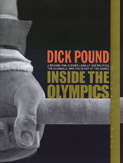
Everyone loves an insider's book and no one is more inside the Olympics than former IOC vice-president Dick Pound. He competed in the games, raised billions to support them in sponsorship and television revenues, and even tried to clean them up.
Despite what he has seen in his half-century of involvement in sports performance and administration, Pound remains "an unrepentant idealist" who sees the Olympics as a force for good in the world. He also knows only too well of the cheating by some coaches, athletes, doctors and judges, and that those committees bidding to hold the games in their cities who flout the rules "have been met halfway (if not further) by some members of the IOC."
Pound takes readers from preparations for the Athens games later this summer (security is a huge concern, venues may be unfinished, transportation will likely be a nightmare) through judging and doping scandals, boycotts, high-stakes TV negotiations, and an up-close look at Juan Antonio Samaranch. Pound worked with the former IOC president throughout the length of his tenure and paints a picture of an ambitious, vindictive and shrewd man with a prodigious work ethic.
He was a brilliant tactician, and Pound says that "hardly a day went by when I did not learn something from watching Samaranch, even though it might well have been something I did not really want to learn or was something that I would never want to do myself." Whatever his personal feelings, Pound served his president well. His marketing savvy and negotiating skills, combined with his integrity and outspokenness may have kept the games from sinking under the weight of debt, corruption and public cynicism. Those same qualities likely lost him the chance to succeed Samaranch who, incidentally, did not support Pound's candidacy. He is bitter about the result, primarily because he placed third behind Korean Un Yong Kim, widely known to be corrupt. Two years after the election, Kim still has $1.5 million in cash from contributions made to support his campaign.
Athens is an opportunity for renewal, says Pound, who now heads the World Anti-Doping Agency. The return of the games to their birthplace is a chance to reaffirm the values of sportsmanship, respect and fair play that inspired the founding of the modern Olympics, "this wonderful crucible of competition."
Inside the Olympics is well written and loaded with enough detail and insight to provide a fascinating glimpse of this organization that is certainly more than the sum of its often unsavoury parts.
Diana Grier Ayton
Stan Lee and The Rise and Fall of the American Comic Book, Chicago Review Press, 2003, $37.95, by Jordan Raphael, BA'97, and Tom Spurgeon
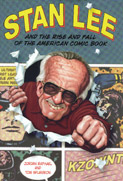
Never heard of Stan Lee? Recent films built around some of the characters he's created have grossed more than a billion dollars and chances are you've heard of them. Spider-Man. The X-Men. The Hulk. Not to mention Daredevil, the Fantastic Four, Iron Man, and other costumed heroes and villains who have battled for decades in the pages of Marvel Comics.
In Stan Lee and The Rise and Fall of the American Comic Book, Jordan Raphael and Tom Spurgeon trace Lee's long career in the comics industry, ranking him with Star Wars creator George Lucas and Harry Potter author J.K. Rowling in terms of contributions to pop culture.
Lee's first comics scripts were penned in the 1940s, a couple of years after the debut of Superman. Back then, comics were a wildly popular medium, selling millions of copies, and publishers were desperate for writers who could cobble them together swiftly.
"Nobody had any respect for comics. It was the lowest rung on the creative totem pole," Lee tells his biographers. He developed a reputation as a quick scribe who could effortlessly bounce from genre to genre - monsters, funny animals, westerns, romance, whatever sold best at the time. Still, he began to view himself as a hack and longed for a better-regarded profession.
Then in the early 1960s, superheroes became hot again, thanks to the introduction of new versions of classic DC characters like the Flash. Working at Marvel, DC's archrival, Lee was asked to create a superhero team since one of DC's best-selling books was the Justice League of America, an all-star collection of that publisher's leading characters, including Superman and Batman.
With artist Jack Kirby, Lee produced a book that changed comics forever - the Fantastic Four. Composed of a bickering crew that included a hot-tempered teenager who transformed his body into living flames and a self-loathing monster who tossed around automobiles with ease, the book was an instant sensation. Spider-Man and other Marvel heroes quickly followed. Lee's characters were noticeably different from the typical, square-jawed superheroes. They had personalities. They screwed up on occasion. They wrestled with guilt, envy and self-doubt.
Many comics fans and scholars pillory Lee for taking too much credit for Marvel's success. The authors explain how artists Jack Kirby and Steve Ditko played pivotal roles. Ditko illustrated Spider-Man, while Kirby's artwork fueled the Fantastic Four, the Hulk and countless others. They didn't just draw the characters. Lee generally provided only bare plot essentials, trusting his gifted artists to fill in the blanks. But it was the charming and outgoing Lee, a natural-born promoter, who emerged as Marvel's public face. Although much of his writing seems hackneyed today, his seminal work in the '60s paved the way for many of the top-notch comics currently produced.
Stan Lee recently earned nominations for both Eisner and Harvey Awards, the comics industry's top prizes. The acclaim is well deserved. The book offers not only a lively and fair-minded appraisal of Lee's contributions, but also an astute snapshot of how the business has evolved over the decades.
Daniel McCabe, BA'89
The Naked Corporation: How the Age of Transparency will Revolutionize Business, Viking Canada, 2003, $40, by Don Tapscott and David Ticoll, BA'68
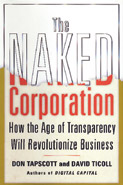
If you have to be naked, you had better be buff," say the authors of this guide to the new age of transparency in corporate affairs. The Naked Corporation sets out to show how and why the companies we invest in should let us know what's going on behind the corporate doors. The Internet has in part thrust this transparency on them, and according to the authors, the new nakedness has created a power shift toward customers, shareholders, employees and other stakeholders. Don Tapscott and David Ticoll have created a manifesto to be heeded by today's corporate leaders. As they quote from German poet Friedrich Schiller, "It is wise to disclose what cannot be concealed."
With regards to the Internet creating a new business dynamic, the authors point out a person need only go online, type a company name into a search engine, and the odds are good that results will include exposés, dirty company tricks, protest and scandal. Entering "McDonald's" into Google yields first the McDonald's corporate site followed directly by McSpotlight, the self-proclaimed "biggest, loudest, most read anti-McDonald's extravaganza the world has ever seen," with enough bad publicity to send most CEOs diving for cover.
"Business leaders," write Tapscott and Ticoll, "who just yesterday were revered, are today mocked and reviled," and the integrity of corporate accounting has been undermined by the Enrons of the world. Young people in particular are highly distrustful of the corporate world. Add to this the "viral marketing" effect of the Internet which can "pummel an unsuspecting company with sarcasm" from parody sites, bogus press releases as well as legitimate criticism and public airing of dirty laundry, and you have a powerful incentive to change the culture. "The only real defense," say the authors, "is to behave in a manner that doesn't invite ridicule."
The Naked Corporation is not a mudslinging book, however, and the authors have laid out a balanced view of how business is conducted currently and how it should be carried out in the future. Some corporations even garner praise: Johnson & Johnson and British Telecom are both held up as exemplary in their transparency.
To combat the climate of corporate fraud, the authors propose a new corporate title and role for this dawning age of business ethics: the Business Integrity Officer. Whether such a role would amount to anything more than spin doctor remains to be seen, but Tapscott and Ticoll outline the BIO mandate with ten characteristics of the new, more transparent enterprise, including "corporate character," "environmental engagement," and "clear governance and reporting," in an effort to weave the new integrity and ethics into corporate DNA. While it's likely to take more than this to turn the tide of resentment and suspicion, their proposals are timely, insightful and in many cases may prove the key to corporate survival in the future.
Andrew Mullins
Womankind: Faces of Change Around the World, Raincoast Books, 2003, $39.95, by Nance Ackerman and Donna Nebenzahl, BA'75
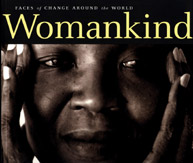
This collaboration of Montreal Gazette writer Nebenzahl and photographer Ackerman grew out of a series of daybooks the pair produced in the 1990s highlighting women in Quebec who work for social change. Over a few years, they expanded to feature women from across Canada. They paused as their families became established and then came together again to travel the world gathering material for Womankind.
Sandwiching trips between significant soccer championships and dance recitals on their children's agendas, the two went in search of "women who choose to care, and fight." Many of their subjects have had to stand up in the face of derision, arrest or death threats to achieve such goals as creating opportunities for women and ending violence, child labour, genital mutilation, and the mistreatment of army conscripts and prison inmates. Womankind is an affecting combination of strong, rich images and touching words.
Dr. Joe and What You Didn't Know: 177 Fascinating Questions & Answers about the Chemistry of Everyday Life, ECW Press, 2004, $17.95, by Dr. Joe Schwarcz, BSc'69, PhD'74
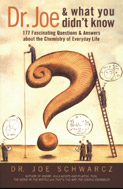
Dr. Joe Schwarcz is back again with fascinating answers to questions about the everyday world of chemistry and science. Schwarcz is well known for his radio spots, newspaper columns and regular appearances on the Discovery Channel. With his new book, Dr. Joe and What You Didn't Know, you'll find detailed answers to the kinds of questions your kids stump you with: How do cap pistols produce their bangs? What's the difference between brown eggs and white eggs? Why do lobsters change colour when we cook them? How do you make a marshmallow? And there are helpful facts about the minutiae of daily living, from food to household items and more: What do the SPF numbers on sunscreen mean? What's so special about Kopi Luwak coffee? Why does the risk of vitamin B12 deficiency increase as we get older? How do you remove a cockroach from your ear?
Schwarcz offers anecdotal stories, sound practical advice and safety tips, and more than a few chuckles. Not to mention some great conversation starters. Oh, and the cockroach trick? Go to a doctor and they will use lidocaine. Mineral oil will work, too, though not as effectively.
Dad Alone: How to Rebuild Your Life and Remain an Involved Father After Divorce, Véhicule Press, 2003, $14.95, by Phil Clavel, MEd'88
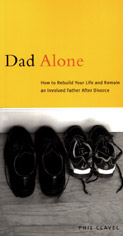 |
Phil Clavel offers up an invaluable guide to recently divorced fathers wishing to remain involved in their childrens' lives. Dad Alone is a reflection of a five-year period in Clavel's life that followed the collapse of his marriage, his subsequent divorce and his efforts to maintain an active role as Dad while rebuilding his personal life. Clavel stresses the need for men to fulfill their roles as fathers in the aftermath of a broken marriage and offers advice and insights from his own personal experience of rebuilding the new family unit. Everything from telling the children about the divorce to finding a new place to live to introducing the children to a new girlfriend is covered in a handy reference format. |
René Habachi: Les monothéismes et la paix, Médiaspaul 2003, par Chantal Hoss, MA'00
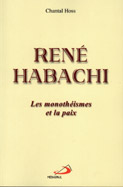
L'auteure présente la pensée originale du philosophe chrétien de renommée internationale René Habachi, libanais d'origine égyptienne. Avec un demi- siècle d'avance sur la diplomatie d'aujourd'hui, Habachi esquisse les défis qui doivent relever les trois monothéismes - judaïsme, islam et christianisme - pour coexister pacifiquement sur un territoire qui est au cœur de l'actualité internationale depuis plusieurs années: Égypte, Liban, Jordanie, Palestine, Israël, Iraq. Chantal Hoss, qui est née au Caire, a été l'élève d'Habachi alors qu'il enseignait la philosophie au Pensionnat du Sacré-Cœur. Elle entretient un intéreat constant pour les questions actuelles que soulèvent la pensée et l'œuvre de René Habachi.
A Day's Grace: Poems 1997-2002, The Porcupine's Quill, 2003, $12.95, by Robyn Sarah, BA'70, MA'74
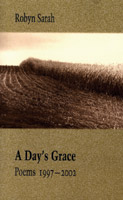
Robyn Sarah has lived for most of her life in Montreal, and her poetry began appearing in Canadian literary magazines in the early 1970s, while she was completing her studies in philosophy at McGill. She is the author of several previous poetry collections and two collections of short stories, and her writing has appeared in such publications as The Threepenny Review, The Malahat Review, Books in Canada and The New Quarterly.
The poems in this collection reveal an accomplished hand and capture everyday moments in seemingly effortless and elegant language - they "make much of something small," as Sarah exhorts her readers in the poem "Bounty." A marvellous formalist who eschews flash for true craft and sophistication.
Sand for Snow: A Caribbean-Canadian Chronicle, DC Books, 2003, by Robert Edison Sandiford, BA'90
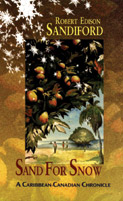
Sand for Snow grew from a series of columns and articles written while journalist Robert Edison Sandiford was based in Barbados. Sandiford grew up in Montreal and moved to his parents' native Barbados in 1996 for "wife and work," as his new bride was Bajan and he had landed an editor's position at the leading daily newspaper in that country. It's a move from a city that for nearly five months of the year is under the thumb of Old Man Winter to an island in the Caribbean, a place Sandiford describes as "almost always hot, where a picnic can be had any day of the week, any time of the year, where you can get a snow cone year round." In his new environment, Sandiford ponders what it means to be Bajan, and what it means to be Canadian, and how best to reconcile the two within himself. "Some days, I am a man happily caught between two countries. Other days, I am a man searching for a place to call rightly my own." What follows is part travelogue, part memoir, and an entertaining critique and celebration of island life and city life.
High Impact Quotations, Fitzhenry & Whiteside, 2004, $45 ($27.95 paperback), selected by Richard W. Pound, BCom'62, BCL'67
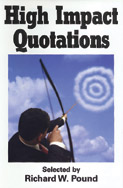
McGill Chancellor Dick Pound writes in his introduction to this book that he began several years ago to jot down quotes that appealed to him. "I needed them for a broad range of speeches that I was called upon to give, so that I could masquerade as someone far more learned than I really am, as well as for snappy comebacks when cornered." The end result - after a valiant battle with his computer to input the textual snippets he'd collected on myriad bits of paper - is High Impact Quotations. In it, one finds over 4,500 quotations, and not just your standard Shakespeare and Roman senators. There are quotes from authors, humorists, journalists, TV hosts, actors, artists, even Qantas Airlines. On one page we find Miguel de Cervantes or George Bernard Shaw, on the next Conan O'Brien or Dean Martin. From wise to witty to laugh-out-loud hilarious, this is definitely more fun than Bartlett's.


